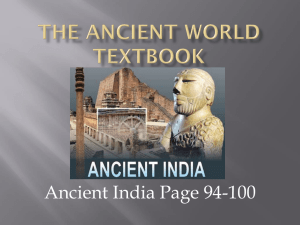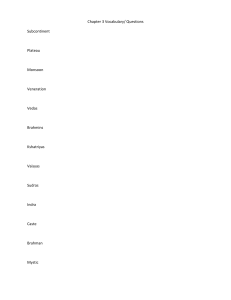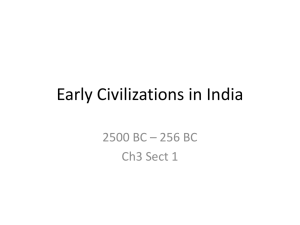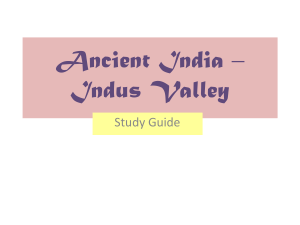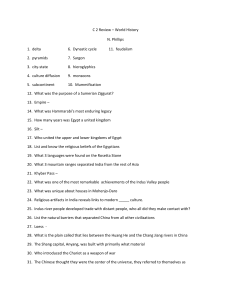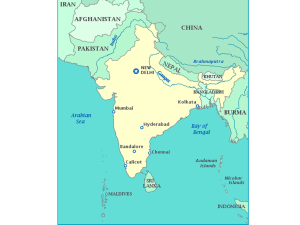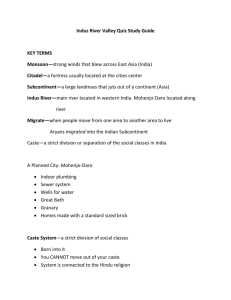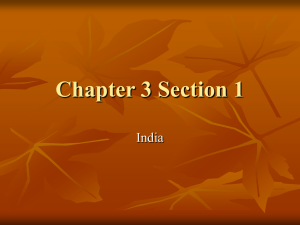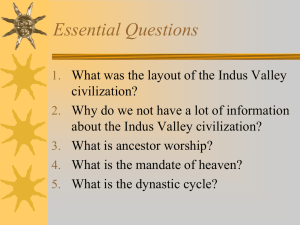Title: Roman Republic
advertisement
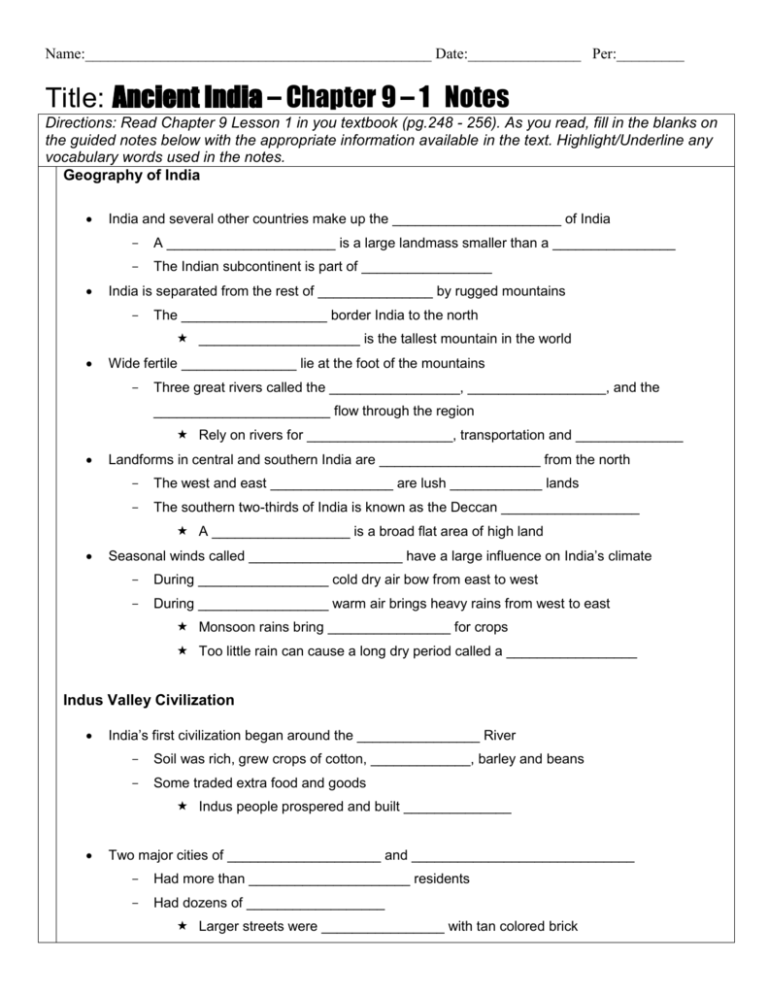
Name:______________________________________________ Date:_______________ Per:_________ Title: Ancient India – Chapter 9 – 1 Notes Directions: Read Chapter 9 Lesson 1 in you textbook (pg.248 - 256). As you read, fill in the blanks on the guided notes below with the appropriate information available in the text. Highlight/Underline any vocabulary words used in the notes. Geography of India India and several other countries make up the ______________________ of India - A ______________________ is a large landmass smaller than a ________________ - The Indian subcontinent is part of _________________ India is separated from the rest of _______________ by rugged mountains - The ___________________ border India to the north _____________________ is the tallest mountain in the world Wide fertile _______________ lie at the foot of the mountains - Three great rivers called the _________________, __________________, and the _______________________ flow through the region Rely on rivers for ___________________, transportation and ______________ Landforms in central and southern India are _____________________ from the north - The west and east ________________ are lush ____________ lands - The southern two-thirds of India is known as the Deccan __________________ A __________________ is a broad flat area of high land Seasonal winds called ____________________ have a large influence on India’s climate - During _________________ cold dry air bow from east to west - During _________________ warm air brings heavy rains from west to east Monsoon rains bring ________________ for crops Too little rain can cause a long dry period called a _________________ Indus Valley Civilization India’s first civilization began around the ________________ River - Soil was rich, grew crops of cotton, _____________, barley and beans - Some traded extra food and goods Indus people prospered and built ______________ Two major cities of ____________________ and _____________________________ - Had more than _____________________ residents - Had dozens of __________________ Larger streets were ________________ with tan colored brick Name:______________________________________________ Date:_______________ Per:_________ - Used oven baked _______________ to build homes - Engineers and builders were highly __________________ - Most people ________________ in farming villages outside the cities - City residents were ________________, shopkeepers and ________________ Merchants traveled as far as __________________________ to trade Aryan Migrations and Settlement Around 1900BC, people of the Indus Valley began to ____________________ their cities and villages - Severe drought lasted hundreds of years Destroyed ________________ and people starved - Earthquakes and _________________ changed course of the Indus River - New people __________________ to India The _______________ were not a race or ethnic group - Part of a _______________________ (group of similar languages) known as Indo-European - Lived in central ________________ but migrated to other places Raised ________________ for meat, milk and butter Moved from place to place to find pastures and _________________ - Were expert horse riders, hunters and fierce ___________________ Sometimes ___________________ nearby villages Moved throughout India and mixed with ______________________ of the Indus Valley people - Settled down and became __________________, but still raise cattle Eventually saw herds as sacred (special or holy) and banned the use of _____________________ as food - Turned the __________________ River valley into productive farmland Grew many crops such as wheat, millet and barley In the _________________ farmers grew cotton, vegetables, ________________, ginger and __________________ Aryans lived in __________________ led by a ________________ (prince) - Created small kingdoms Name:______________________________________________ Date:_______________ Per:_________ Fought over cattle, treasure and ____________________ At first, they had no written _____________________ - They settled and developed written language called ___________________ Recorded sales, trade and land ownership - Eventually wrote hymns, _______________, poems and ___________________ Collected into sacred texts known as the _____________________ Ancient Indian Society System of social classes developed - Four social classes in India were called __________________ _________________ were priests and the most powerful Kshatriyas were __________________ who ran government and army ______________ were commoners who were usually farmers, artisans and merchants Sudras were manual workers and _______________ with few rights - Four Varnas are divided up into thousands of _____________ Each group had its own strict rules of diet, marriage, and social customs - Varna system is called a _________________ system People remain in the same caste or social group for _____________ - Lowest level of society were the _______________________ or Pariahs Not part of Varna system Did things varnas would not do: collecting ____________, skinning animals and carrying _______________________ ___________________ center of Aryan life - Grandparents, parents and ___________________ lived together - Elder family members were ____________________ - Oldest _______________ was in charge of household - Men had more ___________________ than women - Boys had a __________________ (teacher) - Parents arranged marriages for their children Married as teenagers Not allowed to ____________________
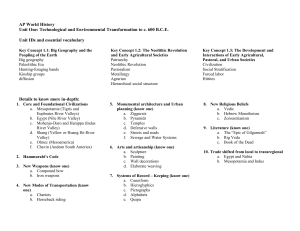
![Indus[1] - ridgeaphistory](http://s3.studylib.net/store/data/006736077_1-c59280ecd30594bac8ab21ec7bce4db4-300x300.png)
